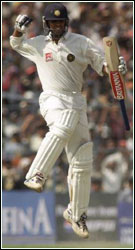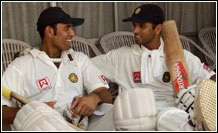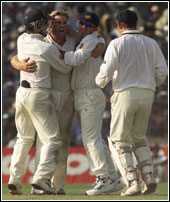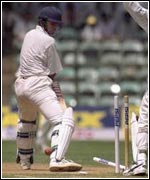Faisal Shariff
Every time that man with a wee trot in his bowling lobbed the cherry at the batter he was offered the pad. The rules of the game had changed. The willow
was gathering cobwebs, as was the array of strokes Rahul Dravid possessed.
Warne, the trotter, was looking more menacing that he ever will in these parts of
the globe when he pitched it on those rough areas on leg to Dravid. It seemed
that it was only yesterday that Hampshire played Kent and Dravid, wearing  dancing
slippers, translated everything that Warne had in his armoury. The Wisden Cricket
Monthly described the encounter as the highlight of the season. The batter won
that campaign; the blonde tweaker seemed to be winning this one.
dancing
slippers, translated everything that Warne had in his armoury. The Wisden Cricket
Monthly described the encounter as the highlight of the season. The batter won
that campaign; the blonde tweaker seemed to be winning this one.
'Too slow; forgets Test cricket is about getting runs; thinks too much about his
batting instead of just playing his normal game; reads more words than scores
runs.'
That was the reproach from all around, and also from every 'Johnny', who, irrespective
of whether he had or hadn't played the game, spoke with the coaching wisdom of
a Woolmer or Simpson.
Soon Dravid was under pressure after holding the number three spot for four
years with an unwavering average of fifty-plus. Today, he walks out to bat at
number six, as the last 'recognised' batsman. Actually, the irony of the word 'recognised' lies in its very reference to the Karnataka batsman. His efforts have always been either eclipsed by another brilliant innings or conveniently ignored. He isn't your dynamic stroke maker or the prodigious crowd-puller; he is a grafter, who believes in wearing down his opponents before stinging them.
"I have no problem batting at any spot. It is a little tough to lose your
position, but if we win and continue winning, I don't want it back. And, anyway,
batting at number six may benefit me. I've played at number three for years, and
with pride," says Dravid, reflecting on his relegation down the batting order.
At a press conference after his record-breaking partnership with VVS Laxman, in Calcutta, Dravid commented that he would bat at any position and even carry the drinks if his captain and coach asked him to.
 "There was nothing emotional about it," defends Rahul. "I don't mind criticism, but I thought that some people were taking perverse pleasure in running this team down; in losing faith in this team too soon. I am not bothered about what
they have to say about me. I think it is grossly unfair to withdraw support to a team that is working so hard and sincerely. In that respect it is a great team; a team that wants to work hard and give off its best. Sooner than later you saw how we turned the tables in Kolkata."
"There was nothing emotional about it," defends Rahul. "I don't mind criticism, but I thought that some people were taking perverse pleasure in running this team down; in losing faith in this team too soon. I am not bothered about what
they have to say about me. I think it is grossly unfair to withdraw support to a team that is working so hard and sincerely. In that respect it is a great team; a team that wants to work hard and give off its best. Sooner than later you saw how we turned the tables in Kolkata."
Dravid goes on to analyze his batting in the ongong series against Australia and attempts to explain the reasons for his sudden, barren scoring periods.
"At times the runs don't matter. I bat time. That is what Test cricket is all
about, all said and done! It is all about how long you can keep the opposition in the park and back yourself," he argues.
"It was not easy batting in Bombay on that wicket. I got out trying to up the tempo because I realized that after Mongia there was no one else to score the runs. Deep down I may feel that, maybe, I didn't score enough runs after facing 190 balls; maybe, I missed a couple of short balls, but then that is me; that is the way I play my game.
"In the first innings in Kolkata I got 25 in 80 deliveries; just check my record
at other times. Even in the second innings, I must have scored my first 25 off
the same number of balls, or maybe fewer. [He used 74 balls to for his first 25
runs; in the first innings at Madras he got his 25 of just 41 balls] But then,
at the end of the day, I scored 148 runs in a single day; you can't ignore that,
can you?"
 Dravid's slow pace, however, doesn't seem to be unsettling or pressurizing his partners at the other end. According to teammates, he is supposed to have had a chat with Sachin Tendulkar, during which he asked if his slow batting was putting an additional burden on the little master. Tendulkar is believed to have replied in the negative and encouraged his team mate to continue batting as he always does.
Dravid's slow pace, however, doesn't seem to be unsettling or pressurizing his partners at the other end. According to teammates, he is supposed to have had a chat with Sachin Tendulkar, during which he asked if his slow batting was putting an additional burden on the little master. Tendulkar is believed to have replied in the negative and encouraged his team mate to continue batting as he always does.
So, what was the Madras 81 all about? Why the sudden need to push the scoring
rate? Were you trying to prove a point to your detractors?
"I have never played the game to prove anything to anybody or make a
statement. I want to prove to myself that my contribution matters and makes a
difference to the team. I always play according to the situation. If there is an
opportunity to hit I will; if there isn't, then I will bide my time.
"The wicket was good, the score was a healthy 200-plus for four wickets; I
wasn't walking in at 2 for 1 or 3 for 2 wickets. And yes, I am being more positive about
my batting. But the main essence of my batting is still the same.”
However, he is quick to add: "But, I am not very happy with my innings here [the first innings in the third Test at Madras]. I should have stayed back with Sachin and taken complete control of the game. The game has gone back in the balance. We should have wrested the
initiative and not batted again."
And what about Slater's mouthful of hell in the first Test in Bombay. Is Dravid the soft boy of Indian cricket? Why does everyone take him on?
"Maybe, I get under their skin in my own way. I didn't even understand what
[Michael] Slater was saying. It is very difficult to understand what the Aussies are
saying... and that helps. You can hear some common expletives, but, other than that, I
couldn't understand what he said."
But, why doesn't Dravid ever retaliate?
"If I retaliate then it would mean doing something that is not in my character.
Why should I let the opposition get me to do what's out of my character?
Sledging can never upset me. I am completely unaffected with words on the field," he says modestly.
And then there is Shane Warne to talk about.
 "He has got me out seven times in nine Tests and there is no doubt that he is a
great bowler. But it is unfair to say that I have a block against him. I have
proved myself against him on several occasions."
"He has got me out seven times in nine Tests and there is no doubt that he is a
great bowler. But it is unfair to say that I have a block against him. I have
proved myself against him on several occasions."
With three fifties in the last series in India, in '98; a hundred in Calcutta, and a smooth 81 at Madras in the first innings of the ongoing series, Dravid sure does have a point.
But there is more than what meets the eye. Why does Warne get so juiced up about his bowling when Dravid is facing him?
"Warne tends to bowl more negative to me. He backs on me being negative and
upsetting the team cart. He bowls over the wicket in the rough, gets it to turn
in; now that is a very difficult thing to do and, in that, Warne is no doubt
unique.
“Maybe, [VVS] Laxman takes a bolder initiative than I do when facing Warne with that
flick shot. Sachin paddles him; but I am not too comfortable with that shot. I will deal with him in my own way.
"Hasn't [Courtney] Walsh claimed [Michael] Atherton's wicket some 17 times in 27 Tests? If you play each other so much in a short period you will give your wicket away sometimes to the same bowler. Why don't you take a closer look at the mode of dismissals? In
the last series at Chennai, he had me caught at deep square leg, when I was
pushing for runs. In Adelaide, he was bowling at his best and I failed to play
him; in Kolkata, I didn't read his hand as well, as I normally do. But I have played him in England on a turning track and scored 137," Dravid says, in a bid to redeem himself.
As of now, the India vice-captain will have to bat at number six. Perhaps, a foreign tour in the near future -- South Africa, later this year -- could change the equation.
Time, they say, is the only critic without ambition.
Earlier Interviews:
'Sourav is the boss, he knows what to do and he lets you know it, too'
'I was in contention a couple of years before my debut'
Upfront, Down Under
Interviews
Mail Cricket Editor